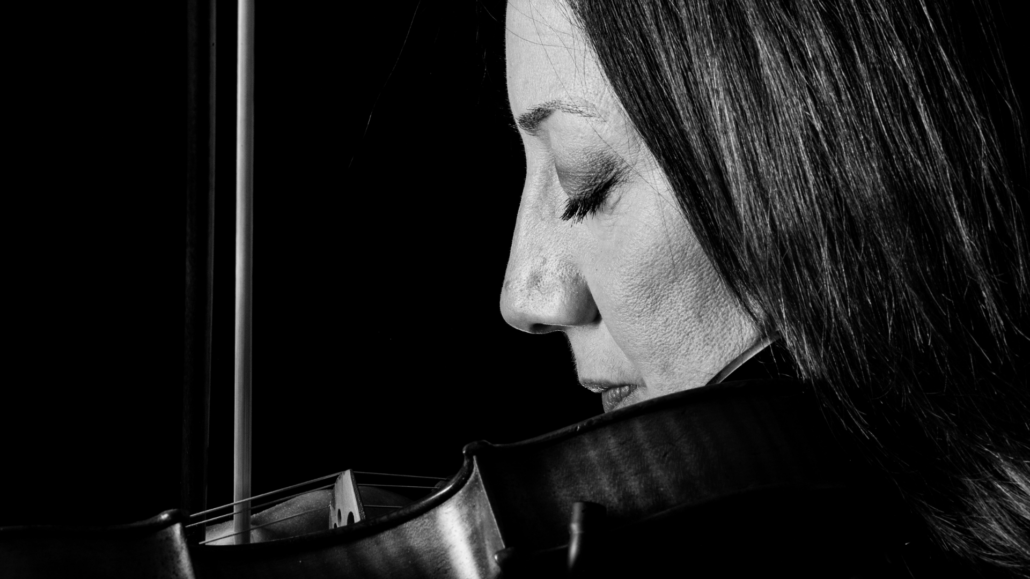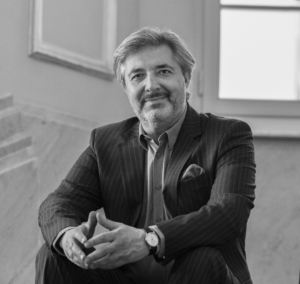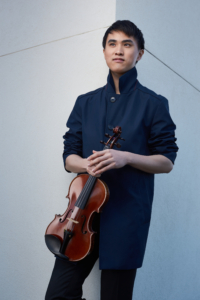MARCH 3, 2024
RAISKIN AND ZHU – PAGANINI
Two centuries ago, Niccolò Paganini’s Violin Concerto in D major was the last word in difficulty, a work so fiendishly showy that only its creator could possibly do it justice. But does it still hold the same place in the pantheon? With all of the advances in violin pedagogy, with Suzuki kids starting as young as three, with how-to videos available at the push of a button, is it even a challenge for today’s virtuosi?
Kevin Zhu thinks so.
“Oh, it’s still terrifying,” says the 22-year-old prodigy. “It’s still scary, I have to say, and it never gets easier. No matter how well you know it or how many times you play it, there are always these terrors, these challenges that somehow you have to cross. And even within the last 50, 60, 70 years, with this massive increase in the general technical level of violinists, people really have a tough time with it. But of course there are always little tricks and secrets that you can discover with time that hopefully make it a little bit more approachable.”
First off, Zhu suggests, it’s necessary to look at Paganini himself, and why he might have been compelled to write something so hard. “Basically, Paganini was kind of the rock star of the time,” he explains. “He was extraordinarily famous, but he was also a very, very intense person. People would notice his music-making not only for his virtuosity, but also for his world-building. He had a natural gift for doing imitations: imitating animal sounds, or imitating scenes that you would see walking along the street of Italy or wherever. Of course his violin competitors at the time called this only a cheap trick, but today we know it as ingenious.”
“He had a particular concert look, too,” Zhu continues. “We know him as this tall, very slender, figure: very skinny, with long fingers. He would walk out on-stage dressed all in black, with a hood… That look, combined with his incredible violin playing, brought out the crowds. And obviously the instrumental fireworks were fantastic, but then he would play something slow—a beautiful song in this Italian bel canto style—and people would faint and throw flowers and everything.”
Or that, at any rate, is the myth. In playing the Violin Concerto in D major Zhu finds it useful to consider the Paganini legend, but also to look analytically at how the 19th-century master achieved his spectacular effects, and why.
“You look, first, at the history of the music, which for this piece especially is strikingly, because it was written originally in a different key,” he says. “It was written in E-flat major, and Paganini actually tuned his violin up half a step to make it sound more brilliant, more striking, and more strident. So you take that into account. And then you know that one of Paganini’s goals was this incredibly brilliant showmanship, so you look at the music and you think ‘Okay, what can I do with all these notes?’ When something is very fast, what does that mean in the context of what he would have imagined, what he would have seen at the time?
“You can imagine one of these Italian palazzos with children running around in these little dashes of notes here and there, or an absolute diva screaming at the top of her lungs in the marketplace. So, slowly, you take the separate pieces of the music and you put them together into your own story about what you think the music represents.”
Zhu’s interpretation is convincing enough that, at 17, he won the Paganini International Violin Competition in Genoa, Italy. His reward was not cash, but something of inestimable value: a chance to play a concert using Paganini’s own fiddle, a 1743 model built by the Cremona school’s Giuseppe Antonio Guarneri.
“Paganini left it to the city of Genoa in his will, and it was kept in a museum for a long, long time,” Zhu says. “Today, it’s housed in a glass case, in this Paganini Room, they call it, in the city hall. It’s played maybe once or twice every year, and each time they take it out to allow somebody to play it you have to have ceremonial Italian military officials watching you to make sure that everything’s okay.”
If playing in front of an armed guard was intimidating, Zhu doesn’t show it. He hopes to eventually record using the Guarneri instrument, and has no difficulty explaining why.
“It was called Il Cannone, or ‘the cannon’, and the first reason is because of its unbelievable power,” he notes. “When I had the chance to play on it, it took a little bit of time to wake up, having been stored away in a glass case for so long. But after maybe 10 minutes or something, the violin comes alive. I felt so clearly that each of the four strings was like a different animal. The bottom string had the character of a bull, and the top string was like a bird flying overhead… It was just the most incredible feeling. And then you come to realize ‘Wow! That’s how he did it.’ That violin helped so much with Paganini’s imagination, and how he wrote his music, and all the techniques that he used. Everything fits together.”
For his Victoria Symphony appearance—in which the Violin Concerto in D major will be presented alongside Gioachino Rossini’s overture from The Barber of Seville, Lera Auerbach’s Eterniday (Homage to W.A Mozart), and Edvard Grieg’s Symphony in C minor—Zhu will have to be content with his everyday fiddle, a borrowed Stradivarius. And he won’t be tuning to E-flat major. “I’m not sure that the people that loaned me my violin would approve,” he says wryly. But the memory of playing Il Cannone and walking the streets of Genoa will follow him into the concert hall, making for as authentic a Paganini experience as this century can afford.
Notes by Alex Varty




 Kevin Zhu, violin
Kevin Zhu, violin